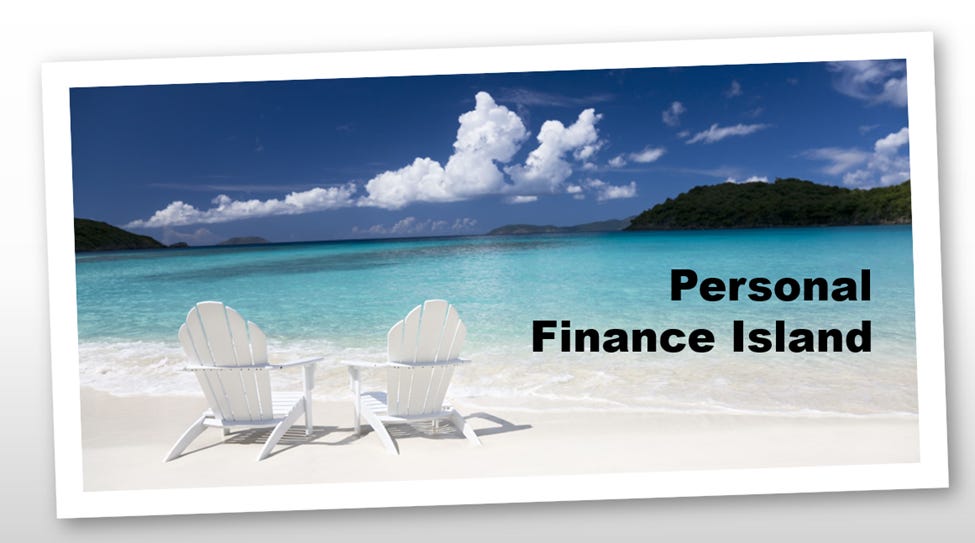📈PFI: Scoring Big with a Credit Card
It’s time again to wend our way through the lush forest path towards the cooling pools found only on Personal Finance Island.
In this edition of Personal Finance Island, we’re covering how to choose your first credit card. This topic might seem basic to some, but, if you’ve never had one before, it’s easy to get lost amidst the acronyms, terms, and incentives. And, as anyone who’s made a major purchase knows, the right decision now can set you up for success later in life.
So, what does someone need to know about credit cards to choose the right one?
There are three things you really need to know to decide if the card is right for you: the interest rate, the credit limit, and the lender. Let’s start with the interest rate.
Interest Rate
The interest rate is the cost to borrow money from the lender and it varies based on your creditworthiness. In general, interest rates range from 12% up to over 25%. For context, the interest rate on a car loan tends to be around 5% right now and it’s important to understand the reason for the big spread.
See, the money lending business is all about risk management. I’m okay lending out $30,000 for a car because if you don’t pay the loan, I get your ride.
That’s not the case with a credit card. If you spend $5,000 on the card and don’t pay, repossessing the dinky little card won’t make me whole. Because credit card loans aren’t secured by anything physical the lender can take back, they’re known as “unsecured loans.” As a result, the lender charges more interest to discourage non-payment.
Fail to pay either loan the lender will report that to three credit reporting agencies (Equifax, TransUnion, and Experian) and tank your credit score. That is bad.
If you’re over 21 and have a full-time job, you shouldn’t have a problem getting approved for a credit card. We’d recommend starting with your existing bank as the existing relationship could mean a slightly better interest rate than starting somewhere new.
Credit Limit
Credit limit is the maximum amount the lender will allow you to borrow. It’s a straightforward calculation that factors in your annual compensation, your monthly rent or mortgage payment, and any other line of credit you have open. Basically, it’s looking at how much you could reasonably repay each month after getting paid and paying the rent.
You want to get the highest possible credit limit the lender will give you.
That might sound irresponsible, but it’s actually the smart move because of something called “credit utilization.” Credit utilization is how much money you’re currently borrowing against your limit. Your credit score will fall if you keep a balance of 30% or more of your available credit at any time.
This means that if you have a $1,000 limit, your “soft” spending limit is $300 before you could start losing points on your credit score. So, try to get the highest limit possible (for as cheap as possible).
Lender
The important thing to know is whether the lender reports your spending to the credit agencies. Lenders like to market what’s known as a “secured” card to first-time borrowers. These cards require a security deposit – often $500 or less – in exchange for a credit limit.
It all sounds good and reasonable, but they can come with one big catch: some lenders don’t report secured card activity to the credit agencies, which defeats the entire point of getting a credit card.
Lastly, perks. Want to crush mai tai’s in Hawaii on the credit card company’s dime? Go for it and get that card with double miles.
Just remember that nothing is free. Credit card companies love to tout the perks and slip the catch in the fine print.
For a first-time card, be happy if the card even comes with perks like no annual fee. The best perk you can find is one that automatically qualifies you for a higher credit limit within a few months for making payments on time.
What’s the Upside?
The trick with your first credit card is to find one that gives you the highest limit with the lowest fees at the best interest rate. Most importantly, once you get the card, don’t be an idiot. You don’t want to spend the next ten years paying off the 30 tequila shots you bought for your friends at the bar. Don’t laugh, it happens. And it can happen quickly.
Build the habit now so it can pay big dividends down the road when you’re ready for your first major purchase and you roll up with a credit score north of 720.
For Your Weekend
Read:
The Perks of Being a Hot Mess by Arthur C. Brooks (The Atlantic)
When people use this term, they generally don’t mean they’re running from the Mob, entangled in a deadly love triangle, or waking up after a bender missing a kidney. Instead, they mean that they feel steaming, churning emotional disarray—they’re unsure of themselves, insecure, neurotic. And everyone can see them for the disaster they are. Or so they think. In truth, you often think you are a lot messier than others think you are. Understanding this and acting accordingly can help you relax and enjoy your hot, messy life a lot more.
Watch:
The Wire (HBO Max)
20 years ago, The Wire debuted on HBO to modest numbers even by premium cable standards. Since then, its reputation has grown to such a degree that it is now the show all other “prestige programming” ends up benchmarked against. Watch it again or start it for the first time.
“If you come at the king, you best not miss.”














